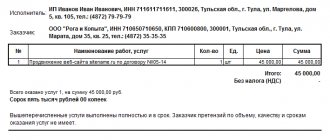The work acceptance certificate is signed, there are no comments, and the contractor calmly waits for the customer to transfer the payment. But time passes, and there is no money in sight. Of course, the customer understands that the contractor can go to court, and will first of all refer to the signed act. Therefore, for the customer, errors in this document or during its preparation are a good way to waste time, challenge the act and legally save on payment for work. Most often, quibbles with documents begin when there is no money or you don’t want to pay under the contract.
The act was drawn up, but other documents were forgotten
The work acceptance certificate is considered the main document that “closes” the execution of the transaction. But sometimes others are required. For example, a contract may oblige an inspection of the facility, a survey or an examination of the work and results. Or you need to accompany the act by drawing up and signing a report on the work performed, and providing technical documents.
How to avoid the problem:
1. Strictly follow the order of delivery of work specified in the contract.
2. Draw up, send, and sign all executive documents in a timely manner.
The Supreme Court pointed out the inadmissibility of the absence of actual transfer of the apartment under the purchase and sale agreement
The Supreme Court published Determination No. 305-ES19-3996 (6) dated August 20, which determined whether the transfer of ownership of an apartment can be carried out under a transfer deed without the actual transfer of property under a sales contract.
Circumstances of the dispute over ownership
On April 23, 2015, Margarita Dyakonova and Victoria Ingulova entered into an agreement for the purchase and sale of an apartment in the amount of 9.3 million rubles. A record of registration of Ingulova’s ownership of the apartment was entered into the Unified State Register of Real Estate on May 13 of the same year.
On October 24, 2021, the Moscow Arbitration Court declared Dyakonova bankrupt and introduced a procedure for the sale of her property, during which the financial manager applied to the court to declare the apartment purchase and sale agreement invalid.
On April 20, 2021, the financial manager’s application was granted, the contract was declared invalid with the consequences of invalidity applied in the form of recognition of the ownership of this apartment by the seller. At the same time, neither Ingulova nor her representative participated in the court hearings. On May 30, 2021, an entry was made in the Unified State Register of Real Estate to register Dyakonova’s ownership of the apartment.
Subsequently, the apartment was put up for sale by the financial manager as the property of a bankrupt individual, constituting the bankruptcy estate. Dmitry Reshetnikov was recognized as the winner of the auction held on December 19, 2021.
On December 25 of the same year, representatives of the financial manager went to the location of the apartment and drew up an act in which they reflected that Ingulova’s neighbors refused to allow them into the common apartment corridor, fenced off by a metal door, and called the police and Ingulova’s relatives. The latter declared the actions of the manager’s representatives illegal and denied them access to the apartment.
On the same day, the financial manager filed a claim to recognize Ingulova as having lost the right to use the property, indicating that she, not being the owner, actually owns the apartment, stores personal belongings there and refuses to hand over the keys to the manager.
On December 26, 2021, the financial manager and Dmitry Reshetnikov entered into an agreement for the purchase and sale of an apartment at a price of about 7 million rubles. On the same day they drew up an act of acceptance and transfer of housing.
On January 9, 2021, the financial manager’s claim against Ingulova was submitted to the Gagarinsky District Court of Moscow.
Victoria Ingulova, having learned about the claims of third parties to the apartment, filed an appeal on January 18, 2021 against the ruling of the trial court dated April 20, 2021, filing a petition to restore the missed deadline for appeal.
Soon after this, an entry dated February 18, 2019 was made in the Unified State Register of Real Estate registering Reshetnikov’s ownership of the apartment.
The Ninth Arbitration Court of Appeal recognized Ingulova’s reasons for missing the deadline for appeal as valid and on April 4, 2021, refused to satisfy the financial manager’s application to recognize the apartment purchase and sale agreement as invalid and to apply the consequences of invalidity. The court found that Ingulova, when purchasing the apartment, acted in good faith, properly fulfilled her obligation to pay for the property, and the transaction price corresponded to the market price.
On May 16, 2021, Victoria Ingulova applied to the court of first instance to invalidate the auction and the apartment purchase and sale agreement concluded between the financial manager and Dmitry Reshetnikov, as well as to terminate the latter’s ownership of the apartment and recognize the plaintiff’s ownership.
Pending the resolution of the dispute by the arbitration court, the Moscow City Court, by an appeal ruling dated August 22, 2021, refused to satisfy the claim of the financial manager to recognize Ingulova as having lost the right to use the apartment. The court of general jurisdiction proceeded from the fact that Ingulova’s property right arose on the basis of a valid purchase and sale agreement dated April 23, 2015, and she did not lose this right, including the right to use residential premises. In addition, the real estate has not been removed from its actual possession since the moment of acquisition. On September 27 of the same year, within the framework of a separate dispute, the Moscow City Court partially satisfied Ingulova’s application, declaring the trading results invalid.
The appeal, in turn, overturned this determination and declared Ingulova’s statement unfounded. The court considered that the auction could be declared invalid only if the procedure for conducting it was violated. In the case under consideration, no such violations were committed; at the time of sale to Reshetnikov, the apartment was included in Dyakonova’s bankruptcy estate. The cassation supported the conclusion of the appellate court.
The Supreme Court indicated that the legal fate of the disputed property was decided against the will of the owner
Victoria Ingulova appealed to the Supreme Court. Having studied the case materials, the Supreme Court indicated that in accordance with paragraph 1 of Art. 235 of the Civil Code of the Russian Federation, the right of ownership terminates when the owner alienates his property to other persons, the owner renounces the right of ownership, the destruction or destruction of property and when the right of ownership to property is lost in other cases provided for by law.
The highest authority noted that the grounds established by law for the termination of Ingulova’s property rights did not arise. An erroneous court decision that was subsequently overturned is not one of these grounds. Consequently, the entries made in the state register about the termination of Ingulova’s ownership of the apartment and the restoration of Dyakonova’s ownership are unreliable.
The Supreme Court indicated that since the apartment was included in the bankruptcy estate in the absence of legal grounds, the financial manager could not dispose of it (clause 1 of Article 209 of the Civil Code).
In addition, the Court noted that if Dmitry Reshetnikov had exercised the minimum degree of diligence that was required of him in the current situation - inspecting the real estate before concluding the transaction - he would inevitably have learned that ownership is carried out by a person other than the seller , as well as about the defects of the registration record on the restoration of Dyakonova’s ownership of the apartment. In this regard, Reshetnikov cannot be considered a bona fide purchaser. “He, as well as the financial manager, who went to inspect the apartment only after it was sold at auction, does not have the right, by virtue of paragraph two of paragraph 6 of Article 8.1 of the Civil Code of the Russian Federation, to substantiate objections to the claim of V.B. Ingulova. references to the fact that they reasonably relied on the state registry entries about the rights of M.S. Dyakonova, not knowing about their unreliability,” the Supreme Court emphasized.
The Supreme Court explained that the provisions of paragraph 7 of Ch. 30 GK. So, in accordance with paragraph 1 of Art. 549 of the Code, the main obligation of the seller under a purchase and sale agreement is to transfer ownership of the real estate to the buyer. According to paragraph 1 of Art. 551 of the Civil Code, the transfer of ownership of real estate is subject to state registration. At the same time, paragraph 1 of Art. 556 of the Code establishes special rules for the transfer of sold real estate from the seller to the buyer: it must be formalized by a transfer deed or other transfer document signed by the parties to the transaction (paragraph 1); The seller’s obligation to transfer the property to the buyer is considered fulfilled after the delivery of this property to the buyer and the signing of the relevant transfer document by the parties, unless otherwise provided by law or agreement (paragraph 2).
Thus, the Supreme Court emphasized, Art. 551 and 556 of the Civil Code determine the moment of fulfillment of the seller’s obligation to transfer property to the buyer: the transfer must take place before state registration of the transfer of ownership; the condition for the transfer of property after registration of the transfer of rights can be agreed upon by the parties in an agreement or enshrined in law.
The definition notes that the financial manager and Reshetnikov in the agreement dated December 26, 2021 did not deviate from the dispositive provisions of paragraph. 2 p. 1 art. 556 of the Civil Code, namely, did not provide that the transfer of ownership does not depend on the fulfillment of the seller’s obligation to transfer the property. In this regard, they executed an acceptance and transfer act dated December 26, 2021. The court noted that this act, submitted to the registration authority, was obviously unreliable: the financial manager, in principle, could not transfer the apartment to Reshetnikov, and he, in turn, could not accept her, since the property was in Ingulova’s possession all the time.
The highest authority added that the main obligation under the purchase and sale agreement dated December 26, 2021 was not fulfilled by the seller - the transfer of real estate to the buyer did not take place, which in this case is a necessary prerequisite for registering the transfer of ownership. This legal position, the Supreme Court emphasized, corresponds to the meaning of the explanations given in paragraph. 2–4 clause 61 of the Resolution of the plenums of the Supreme Court and the Supreme Arbitration Court of the Russian Federation dated April 29, 2010 No. 10/22 “On some issues arising in judicial practice when resolving disputes related to the protection of property rights and other property rights.”
Thus, the Supreme Court concluded, by drawing up a deliberately unreliable transfer act, the financial manager and Reshetnikov artificially excluded the actual transfer of property under the purchase and sale agreement from the legal composition required for registering the transfer of ownership. Under such circumstances, it should be recognized that Reshetnikov did not acquire ownership of the apartment (clause 2 of Article 218 of the Civil Code).
The judicial panel of the Supreme Court considered that the rights of Victoria Ingulova were violated not by the very facts of the auction and the conclusion of an agreement with Reshetnikov, but by the registration of the latter’s property rights, which was carried out without reason and led to the fact that the legal fate of the disputed real estate was decided against the will of the owner, who remained only actual owner.
In paragraphs 58 and 59 of Resolution No. 10/22, the Supreme Court noted, it is explained that a person who considers himself the owner of real estate in his possession, the right to which is registered for another entity, has the right to apply to the court with a claim for recognition of ownership rights. Unless otherwise provided by law, if the plaintiff presents evidence of the emergence of the corresponding right, the claim is subject to satisfaction.
“The requirement for recognition of ownership of the apartment, along with others, is V.B. Ingulova, who is not in an obligatory legal relationship with D.O. Reshetnikov. and having not lost possession, transferred it to the arbitration court of first instance for resolution. She addressed this demand to the proper defendant - the person listed in the state register as the copyright holder. It was this requirement that was subject to satisfaction by the court, since in this part Ingulova V.B. chose the proper method of defense and her claim was supported by the necessary evidence. The corresponding court decision recognizing the property rights of Ingulova V.B. should have become the basis for adjusting the entries in the state register, bringing them into line with the real state of affairs (paragraph two of paragraph 52 of resolution No. 10/22),” the definition emphasizes.
However, the highest authority noted, at present the judicial panel is deprived of the opportunity to satisfy Ingulova’s demand, since, as her representative, representatives of the financial manager and Reshetnikov explained at the court hearing, after the Supreme Court filed the case, an agreement was signed on the further alienation of the apartment to another person, the transfer of rights property to which is registered in the Unified State Register of Real Estate. The last copyright holder was not involved in the case.
The Supreme Court indicated that Victoria Ingulova, who has not committed any imprudent, much less illegal, actions, has been actively trying to legally protect the rights to the apartment in which she actually lives, acquired in accordance with the law, in three trials since January 2019.
“Based on the circumstances of the case under consideration, which changed after the filing of the cassation appeal, the judicial panel considers it possible to state in the operative part of its ruling the conclusion that the property right of Reshetnikov D.O. for the apartment never arose, and leave in force the ruling of the court of first instance regarding the recognition of the result of the auction (agreement dated December 26, 2018) as invalid, bearing in mind the invalidity of the legal effect generated by this agreement in the form of the transfer of ownership to D.O. Reshetnikov,” – is summarized in the document. The Supreme Court added that a different outcome of the dispute resolution at this stage would not correspond to the principle of the effectiveness of judicial protection.
Thus, the Supreme Court overturned the decisions of the lower courts in this case. At the same time, he canceled the ruling of the first instance regarding the refusal to satisfy Ingulova’s demands and recognized Reshetnikov’s ownership of the apartment as not having arisen. The court recognized the requirement to recognize Ingulova’s ownership of the property as subject to review by the Moscow Court of Justice. The rest of the ruling of the first instance is upheld.
Experts emphasized the practical significance of the Court’s legal position
In a commentary to AG, Mikhail Novoselov, a senior lawyer at the Plotnikov and Partners legal group, called the definition useful for practice, since cases of participation of bona fide buyers in litigation by bankrupt sellers have become more frequent.
He noted that, unlike the six judges in the appeal and cassation, the Supreme Court considered the dispute “fairly.” “It is noteworthy that the courts of general jurisdiction also resolved the dispute fairly and refused to evict the original owner, despite the fact that he was no longer listed in the Unified State Register of Real Estate,” emphasized Mikhail Novoselov.
In addition, the decision, according to the expert, is correct from the point of view of risk distribution. He explained that the winning bidder had to understand that he was buying a bankrupt’s apartment under a contested transaction, the decision on which could be cancelled. At the same time, it was easier for him to restore his right by returning the money paid under the transaction. “With a different decision, it would be unfair for the owner to change the apartment for a monetary claim against the bankrupt,” says Mikhail Novoselov. “If the decisions of appeal and cassation remained in force, this would undermine the stability of turnover and the fundamental principles of property rights.”
In his opinion, the Supreme Court correctly did not discuss the issue of notifying the apartment owner about challenging the transaction, since procedural violations should not lead to deprivation of ownership rights.
Mikhail Novoselov called the conclusion of the Supreme Court important for judicial practice that “another outcome of the resolution of this dispute at this stage would not correspond to the principle of the effectiveness of judicial protection.” “This conclusion should help overcome formal court decisions based on the letter of the law, to the detriment of its spirit and effective judicial protection,” he emphasized.
In addition, in his opinion, from the ruling of the Supreme Court it can be concluded that it is necessary to check the seller before purchasing an apartment using a file of court and arbitration cases for possible bankruptcy, as well as to store payment documents in case the transaction is contested and to inspect the apartment before purchasing.
Olga Trokhacheva, head of judicial practice at Grits and Partners, pointed out that questions about the integrity of real estate purchasers often arise in judicial practice. “There are no uniform criteria by which, as if using a checklist, one can check the actions of the parties and make the right decision in cases of declaring transactions invalid. That is why the courts in each specific case need to delve deeply into the situation, analyze the actions of the parties, their sequence and the content of the documents. In the case under consideration, the judges established the good faith of two buyers, to whom the ownership of the disputed apartment was transferred at different times,” she noted.
The expert drew attention to the fact that the Supreme Court, unlike lower authorities, when considering the case, analyzed in detail the actions of the buyer who purchased the disputed apartment at auction. Thus, he found that, if a minimum of diligence had been applied, it would have become clear to the buyer that the property was actually owned by someone other than the seller. The Court also pointed out the importance of the date of transfer of real estate in purchase and sale transactions.
“If the contract does not stipulate that the real estate is transferred after state registration of the transfer of rights, then, as a general rule, it must be transferred to the buyer before registration. In the case under consideration, the contract did not mention the transfer of the apartment - the transfer and acceptance certificate was signed on the day the contract was signed. But since the apartment was actually occupied, it could not be transferred. Having analyzed these circumstances, the Court came to the conclusion that the act was deliberately unreliable, and the actions of the buyer cannot be considered conscientious,” summarized Olga Trokhacheva.
The act was signed by the wrong person
Who signs the act and how is specified in the contract. If this is not specified, the act is signed by the head of the company, the entrepreneur personally, or a person who has the right to sign by proxy. In practice, it happens that acts are signed by anyone, but not by those who should: accountants, foremen, etc.
A separate discussion concerns the commission procedure for accepting work. In this case, the act must contain the signatures of all members of the commission. And until the order is followed, the work is considered not accepted, even if an act is drawn up.
Check
An optional document in which the seller indicates the price, quantity of goods and details for transferring payment.
You can come up with an invoice form for payment yourself or find a ready-made one on the Internet. An invoice can replace a contract if all essential terms of the transaction are included in it.
Invoice template
There is a ready-made invoice template. Select the counterparty, indicate the goods or services, their quantity, and the document is ready.
The act was “rejected” by the accounting department
The certificate of completion of work refers to the primary accounting documents. After his signature, after some time it is transferred to the accounting department - it is she who must make the settlement with the contractor. And this is where problems can arise. It is important for an accountant that the tax inspectorate does not find fault with the transaction, deed and mutual settlements. And if there is such a possibility, the act will have to be redone. Unfortunately, the customer can take advantage of the situation and play for time. To receive payment faster, always inquire about the reason for the delay in settlement. If the customer remains silent, prepare and send a written complaint.








